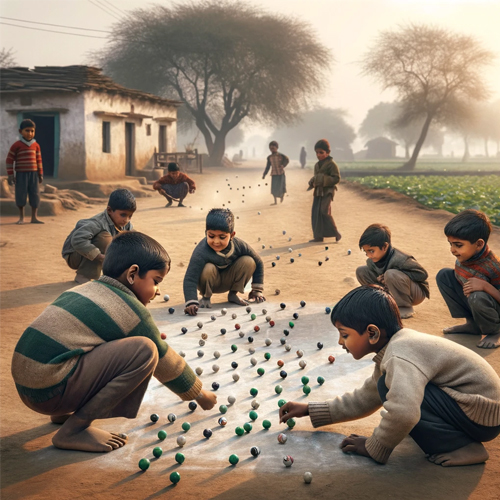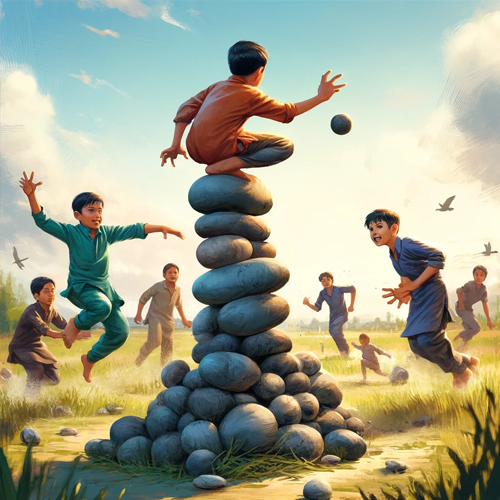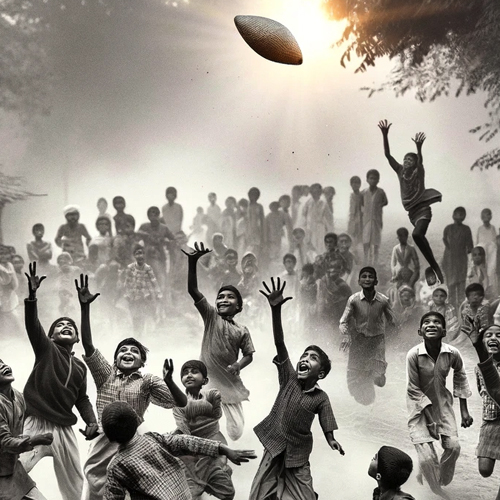List of Games
India has a rich cultural heritage and a long history of traditional games and sports that are still popular today. Here is a list of some traditional Indian games

Marbles (Kancha)
Marbles (Kancha) is a traditional game that has been enjoyed by children in India for generations. Known for its simplicity and fun, it is played with small spherical balls made of glass, clay, or agate, commonly referred to as marbles or kanchas.
Cultural Significance
Marbles (Kancha) is more than just a game; it is a part of the cultural heritage of India. It fosters a sense of community and camaraderie among children. The game helps in developing hand-eye coordination, strategic thinking, and fine motor skills.
How to Play Marbles (Kancha)
The objective of the game is to hit the opponent’s marbles out of a designated area or to collect as many marbles as possible. Here’s a step-by-step guide to how the game is typically played:
1. Choosing the Play Area: The game is usually played on a flat surface, such as a patch of dirt or sand. A small circle or boundary is drawn on the ground to mark the playing area.
2. Setting the Marbles: Each player places a few of their marbles inside the circle. The number of marbles can vary, but it is usually agreed upon before the game starts.
3. Selecting the Shooter: Each player selects a slightly larger marble, known as the shooter. This marble is used to hit the other marbles.
4. Taking Turns: Players take turns to flick their shooter marble with their thumb, aiming to hit the marbles inside the circle. The technique involves holding the shooter marble in the crook of the index finger and flicking it with the thumb to propel it forward.
5. Hitting the Marbles: When a player successfully hits a marble out of the circle, they get to keep that marble and take another turn. If they miss, the next player takes their turn.
6. Winning the Game: The game continues until all the marbles have been knocked out of the circle. The player with the most marbles at the end of the game is declared the winner.
Variations
There are several variations of the game, depending on regional preferences and the players’ creativity. Some common variations include:
1. Ringer: Players shoot their marbles to knock the opponent’s marbles out of a ring drawn on the ground.
2. Bunny: Players try to hit a specific marble out of a smaller circle within the main circle.
3. Bounce: Players must bounce their marble off the ground to hit the target marble.
Lagori (Seven Stones)
Lagori (Seven Stones) is a traditional Indian game that has been enjoyed by children and adults alike for generations. Known for its simplicity and excitement, Lagori involves teamwork, strategy, and agility, making it a favorite pastime in many communities.
Cultural Significance
Lagori, also known as Pittu in some regions, is more than just a game; it is a reflection of Indian tradition and community bonding. It promotes physical fitness, teamwork, and strategic thinking. The game is often played during festivals and gatherings, enhancing its cultural importance.

How to Play Lagori (Seven Stones)
The objective of Lagori is to knock over a stack of seven stones with a ball and then rebuild the stack while the opposing team tries to prevent this. Here’s a detailed guide on how the game is typically played:
Setting Up the Game:
Players: The game requires two teams, each with an equal number of players, typically 5-7 members per team.
Stones and Ball: Seven flat stones of varying sizes are stacked one on top of the other. A soft ball, often made of rubber, is used for throwing.
Starting the Game:
Drawing Boundaries: A circle is drawn around the stack of stones, marking the play area. A line is also drawn to mark the throw line from where players will throw the ball.
Deciding Turns: Teams decide who will throw first, usually by a coin toss.
Gameplay:
Knocking Down the Stones: The game begins with one team (Team A) throwing the ball from behind the throw line to knock over the stack of stones.
Rebuilding and Defending: Once the stones are knocked over, Team A’s goal is to rebuild the stack while Team B tries to retrieve the ball and hit the players of Team A below the knee with it.
Avoiding the Ball: Players from Team A must dodge the ball while attempting to rebuild the stack. If a player from Team A is hit by the ball, they are out of the game.
Scoring and Winning:
Rebuilding the Stack: If Team A successfully rebuilds the stack without all players being hit, they score a point and retain the turn to throw the ball.
Hitting the Players: If Team B manages to hit all players of Team A with the ball before they can rebuild the stack, they score a point and get the turn to throw the ball.
Winning the Game:
The game is usually played for a predetermined number of rounds or until a set score is reached. The team with the highest score at the end of the game wins.
Variations
Different regions have their own variations of Lagori, which may include changes in the number of stones, the size of the playing area, or specific rules about hitting players. Some variations include:
- Three-Stone Lagori: Using fewer stones to make the game faster and more challenging.
- No-Knee Rule: Modifying the rules about where players can be hit to be out.

Guli Danda or Vitti Dandu
Gilli Danda, also known as Guli Danda or Vitti Dandu, is a traditional Indian game that has been played for centuries. It is often described as a combination of cricket and baseball, and it is popular in rural areas across India. The game is simple yet exciting and requires minimal equipment, making it accessible to children and adults alike.
Cultural Significance
Gilli Danda is more than just a game; it is a reflection of rural life and childhood memories in India. It fosters physical fitness, hand-eye coordination, and social interaction among players. The simplicity of the game, along with the thrill of hitting the gilli and scoring points, makes it a beloved pastime.
How to Play Gilli Danda
The game is played with two sticks: a longer stick called the “danda” and a shorter stick called the “gilli.” Here’s a step-by-step guide on how Gilli Danda is typically played:
1. Equipment and Setup:
- Danda: A long wooden stick, usually about 2-3 feet in length.
- Gilli: A shorter wooden stick, around 3-6 inches in length, tapered at both ends.
- Playing Area: A flat, open ground is ideal for playing Gilli Danda.
2. Starting the Game:
- Choosing the Players: The game can be played by two or more players. Teams can also be formed.
- Setting Up the Gilli: The gilli is placed on the ground in a small hole or balanced on a stone or small mound.
3. Gameplay:
Hitting the Gilli: The player (batter) uses the danda to hit the gilli. The goal is to flip the gilli into the air by striking one end of it with the danda, and then hitting it again while it is in the air to send it as far as possible.
- Measuring Distance: The distance the gilli travels is measured using the danda. The batter scores points based on how far the gilli is hit.
- Fielding and Returning: The opposing players (fielders) attempt to catch the gilli in the air or retrieve it as quickly as possible and throw it back towards the batter’s starting point.
4. Scoring and Winning:
- Points: Points are scored based on the distance the gilli travels and the difficulty of the hit. Different areas or targets may have different point values.
- Switching Roles: After a set number of turns or when the gilli is caught by the fielders, the roles switch, and the fielders become the batters.
- Winning: The game can be played for a predetermined number of rounds, and the player or team with the most points at the end wins.
Variations
Gilli Danda has numerous regional variations, with slight differences in rules and scoring methods. Some common variations include:
- Single Player: Played individually with each player taking turns as the batter and fielder.
- Team Play: Teams compete against each other, with team members taking turns to bat and field.
- Target Hitting: Specific targets or zones are set up, and points are awarded based on accuracy in hitting these targets.
